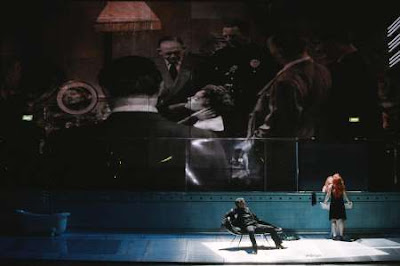
We finally had a
production of Jenůfa in Washington this week. Ionarts should just be happy and savor the moment, right? No, it's time to start asking for the next Leoš Janáček opera to premiere in Washington. How about
The Makropoulos Case? Everyone is doing it: Paris has just done it for the first time this season, following Lyon (2005), the Aix-en-Provence Festival (2000), and Toulouse (1997). Christian Merlin had the review (
Une soirée captivante, May 3) for
Le Figaro (my translation):
It's done! The Makropoulos Affair, one of the greatest Janáček masterpieces, has just entered the repertoire of the Opéra de Paris, and in such a manner! The best way possible, with a production of the first rank, dense, homogenous, coherent, whose musical success is equal to the quality of the staging.
That's what was needed to convince an audience still hardly familiar with a powerfully enigmatic and, all things considered, moving opera. Taking off from the principle that the immortal heroine is a star, still working, the director Krzysztof Warlikowski has made her not a singer but a movie star, bringing together in his visual references Marilyn Monroe, King Kong, and Gloria Swanson. By thus showing an actress who is always playing a role, he risked reducing her humanity but compensates for it by the dramatic concentration of the idea and the virtuosity of his direction of the actors, reinforced by an extremely effective set, even if one may tire quickly of his taste for sinks and bathrooms.
For her début as Emilia Marty, Angela Denoke must confront the memory left behind by Anja Silja in the role of her life: she does not have the monstrous side that made Silja's performance crushing but has a seductive side missing from her predecessor, including a voice that is more lyric than dramatic. No weakness in the cast: the terrified ardor of Charles Workman, the wounded arrogance of Vincent Le Texier, Karine Deshayes's femininity barely out of adolescence, without mentioning the perfect professionalism of Paul Gay, David Kuebler, Alec Briscein, and the marvelous veteran Ryland Davies. People at work! The only regret is that the power of the orchestra requires them to force their sound over them: one defect in the qualities of the young conductor Tomas Hanus, who leads with uncommon intensity, setting the superb Orchestre de l'Opéra on fire, the force behind a captivating evening.
For a review in English, see Jorg von Uthmann,
King Kong Meets 337-Year-Old Heroine in 'Makropulos' Revival (Bloomberg News, May 2). For a negative opinion of the production, see Eric Dahan,
Une «Affaire» qui ne tourne pas rond (
Libération, May 3). The director, Krysztof Warlikowski, gives his take on his staging in an
interview with
Figaroscope. Here are some more
photographs.
 We finally had a production of Jenůfa in Washington this week. Ionarts should just be happy and savor the moment, right? No, it's time to start asking for the next Leoš Janáček opera to premiere in Washington. How about The Makropoulos Case? Everyone is doing it: Paris has just done it for the first time this season, following Lyon (2005), the Aix-en-Provence Festival (2000), and Toulouse (1997). Christian Merlin had the review (Une soirée captivante, May 3) for Le Figaro (my translation):
We finally had a production of Jenůfa in Washington this week. Ionarts should just be happy and savor the moment, right? No, it's time to start asking for the next Leoš Janáček opera to premiere in Washington. How about The Makropoulos Case? Everyone is doing it: Paris has just done it for the first time this season, following Lyon (2005), the Aix-en-Provence Festival (2000), and Toulouse (1997). Christian Merlin had the review (Une soirée captivante, May 3) for Le Figaro (my translation):
Lisa - The 2008-2009 predictions are based on reliable published sources (such as artists' websites or published interviews) or Gockley's own mouth. I'm quite certain that all of the above are currently being planned, but less certain about the timing in some cases. I know that the Trittico will open the season, and the Grimes (with Runnicles conducting), Salome, Fanciulla and Trovatore are definitely for that season. The continuation of the Ring may be for the following season (I can never remember). I'm also not 100% sure about the timing for The Makropoulos Case.
ReplyDeleteThe sweet Opera Tattler also has these listed, though she is not my source:
http://operatattler.typepad.com/opera/2008/01/la-fanciulla-de.html
As for Racette, I gather from the the blogosphere that she is a polarizing figure. For me, she has a pretty voice, but I can't get past her poor intonation. She absolutely ruined the SF Jenufa for me, and was as bad as the rest of the cast in that Luisa Miller. I have always avoided her whenever possible since those two performances, but I heard her in a concert a couple of years ago, and the voice was exactly as I had recalled.